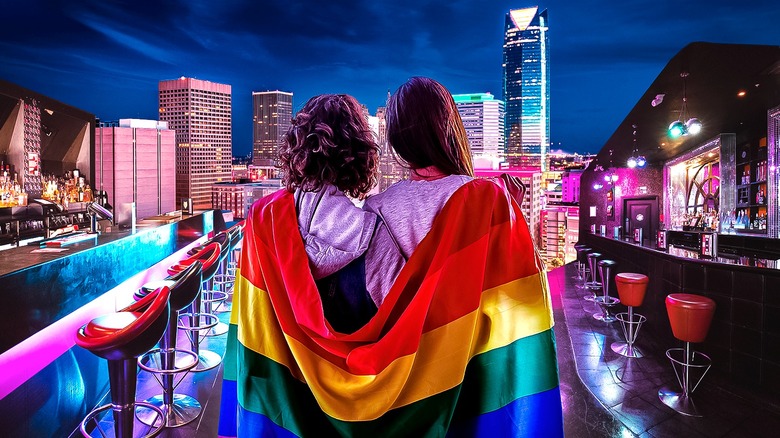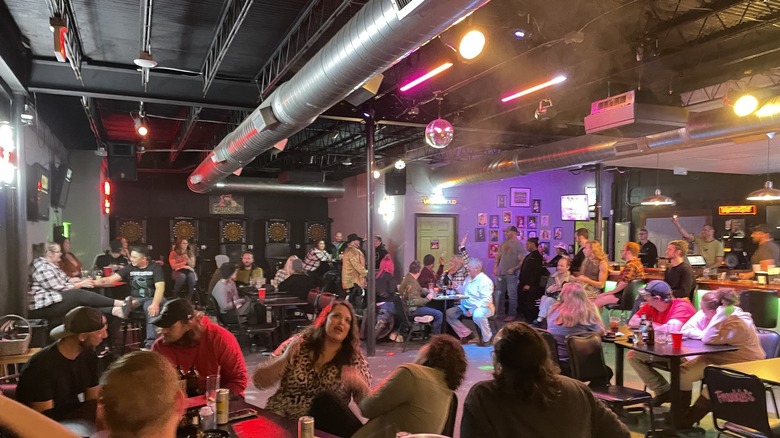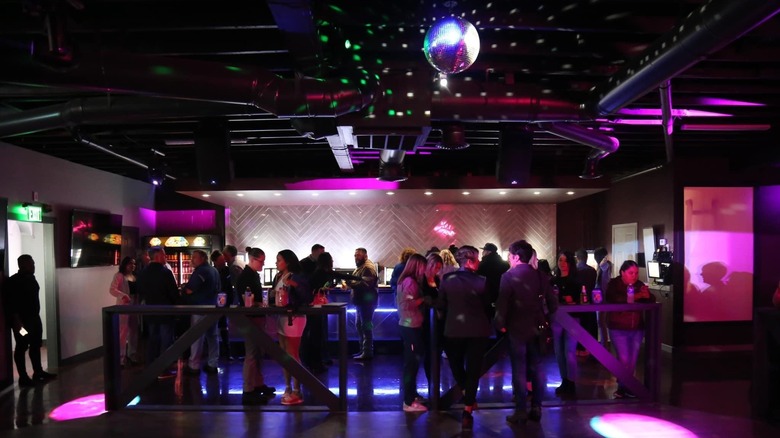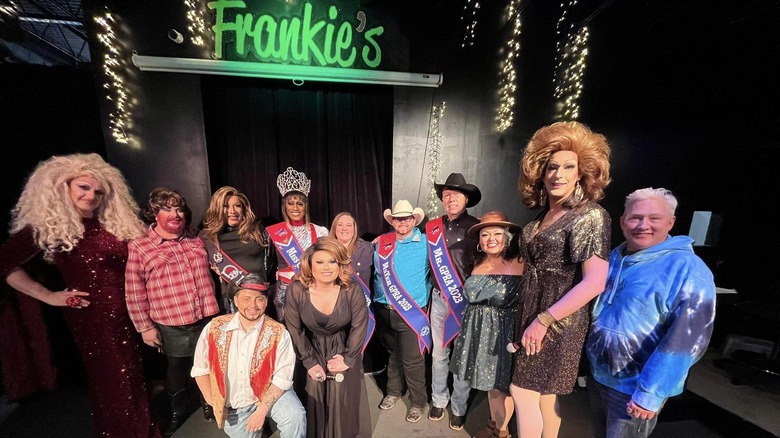Oklahoma Is An Epicenter Of Lesbian Bars In The US
Across the country, LGBTQ+ bars are community cornerstones in cities large and small, providing sanctuary and solidarity with palpable pride. But while generalized LGBTQ+ bars, and LGBTQ+-owned restaurants, are frequent fixtures, lesbian bars are a specific niche that's dwindled to the brink of extinction. In 2021, there were barely a dozen lesbian bars remaining in the entire country, which is a stark contrast to the surplus of thriving gay bars and clubs across the U.S. The causes for such dissolution are myriad, but despite the mass closures, the need for these havens remains, and one state, in particular, has emerged as a surprising hub for America's disappearing lesbian bars.
Oklahoma is a former flyover state that flies in the face of stereotypes. Far more metropolitan, inclusive, and progressive than most might assume (which would be a fair assumption, considering how politically conservative the state tends), social change is afoot in the Sooner State. Notably, while most states currently have zero, Oklahoma is home to more lesbian bars than just about any other state in the country. Anchored by the state's largest cities, Oklahoma City and Tulsa, there are a handful of full-blown lesbian bars — Frankie's and Alibi's in Oklahoma City and Yellow Brick Pub in Tulsa — that have survived and thrived, in addition to those that are lesbian-owned or lesbian-centric — like newcomers Indigo Lounge and The Secret in Oklahoma City. Here's how Oklahoma has calcified as a seemingly unexpected oasis for lesbian bars in the U.S.
Sanctuaries in a Conservative State
Quite simply, lesbian bars are sanctuaries in a political and social environment where they're needed. Unlike liberal bubbles like New York City and San Francisco, where queer communities are more universally embraced, Oklahoma is still a state where LGBTQ+ people seek solidarity. According to Rachael Leonhart, executive director of Oklahoma City's loud-and-proud Plaza District, "adversity breeds community." She describes the state's robust queer scene as the community rallying together to beat the odds. "People are beginning to understand the value of embracing queer culture," she says. "You have spaces dedicated to queer women, like Alibi's and Frankie's." That value, according to Ann Harris, co-owner of Frankie's, is crucial for a conservative state. "It's necessary here," she says of the bar she co-owns with her wife. "We live in a red state, and we can go as a gay couple to a restaurant and servers and owners are welcoming to that, but not necessarily other people in the restaurant. This is a safe space."
Alexis Clements, director of All We've Got, a 2019 documentary about America's disappearing lesbian bars, agrees: "It's a lot to do with conservatism, and that's different from a city like New York City," she says. "There's no need to go to a queer bar (in NYC) because I can go anywhere; I'm not getting side-eyed or yelled at when I walk into the bathroom." In Oklahoma, regardless of its surprising social progress and population growth, lesbian bars are still vital.
Room For All Types of Lesbian Bars
Lesbian bars tend to be more inclusive of everyone in the LGBTQ+ community — and they coexist harmoniously. For instance, Frankie's and Alibi's in Oklahoma City feel like casual corner dives, while The Secret is more of a disco-clad club, and Indigo Lounge, a lesbian-owned newcomer in the "gayborhood" amidst a sea of gay bars, boasts chic, relaxed environs. Then there's Tulsa's Yellow Brick Road Pub, which just reopened after a fire and offers a pub vibe with video games. Each coexists, with enduring appeal. "Each bar has its own niche," notes Harris. "We're not gonna step on what you do. If the gay community as a whole came together, we all have something to offer."
"A bulk of the clientele in most bars that have a focus on queer women, it tends to be that you need a lot of 20-30 year-olds to be in the bar," describes Clements. "You need to constantly be cycling new things into the bar, and one of the biggest things is that Krystal and Tiffany (owners of Alibi's) made a big point about the bar being inclusive. Especially for bars that are owned by queer women, it has always been the case that they're a little more inclusive than bars intended for gay men. In 2021, that's become even more explicit, and that's particularly true in communities like Oklahoma, with some of the social pressures of a more conservative town, everyone needs a place to go."
Oklahoma's Population is Getting Queerer
As Oklahoma City continues to boom in population, an influx of new — and increasingly diverse — residents means the social landscape for the whole state is inevitably changing. Earlier this year, Oklahoma surpassed 4 million residents for the first time, while Oklahoma City's population growth is twice as fast as the national average, and Tulsa Remote has become the most successful worker relocation program in the country, incentivizing a wave of new residents from a diverse range of backgrounds.
Coupled with the state's low cost of living and doing business, it's the perfect recipe for LGBTQ+ residents and bars to thrive. "The scene will continue to grow, and I think it's only a matter of time before Oklahoma City is one of the most sought-after queer destinations in the world," says Leonhart. "Our public spaces are welcoming in programming like drag story hour. Our largest public park downtown hosts Pridefest. Some of the most influential queer-friendly organizations in the world are based right here (Freedom Oklahoma and Free Mom Hugs, to name a couple). Again, adversity breeds community. As long as queer Oklahomans and our allies continue to show up and show out (and they will), the queer scene in Oklahoma will continue to grow."



